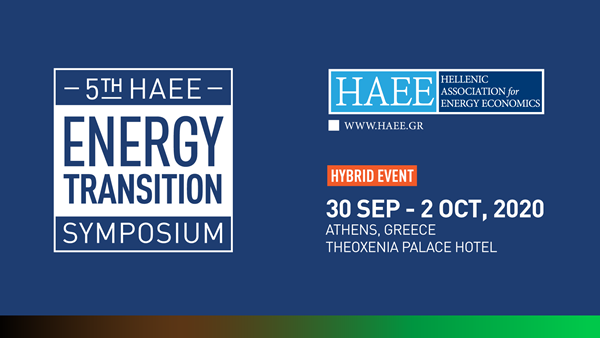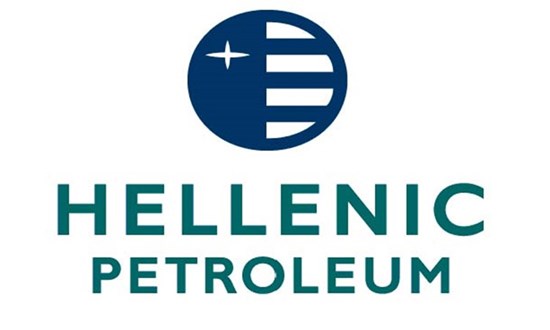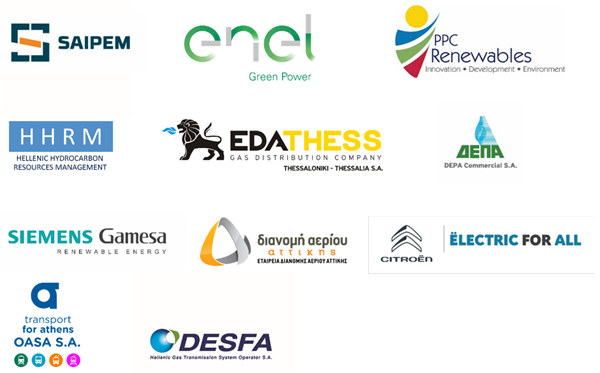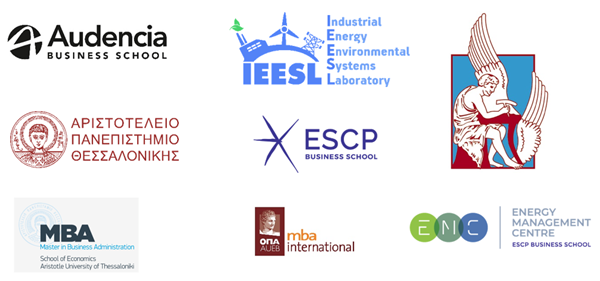
PRESS RELEASE5th HAEE ENERGY TRANSITION SYMPOSIUM Athens 12.10.2020. The 5th Energy Transition Symposium “Global and Local Perspectives” of the Hellenic Association for Energy Economics was successfully organised as a hybrid event from 30 September until 2 October 2020. The Symposium focused on energy transition related features, such as decarbonization in Europe and Greece, the target model, hydrocarbons research in Eastern Mediterranean, natural gas infrastructures and market in SE Europe, ecomobility, hydrogen’s role and the impact of coronavirus pandemic in the energy sector. For yet another year, the Symposium constituted an international platform for promoting substantial dialogue around all pertinent energy issues. 20 dedicated sessions, more than 120 speakers, 20 academic paper presenters and over 8.000 viewers, composed the international, academic and specialized character of the Symposium, offering an in-depth analysis of the energy sector for physical and digital attendees. Experts, senior executives, state officials and academics from institutions, organisations and enterprises from Greece and abroad had the chance to express their views and discuss all crucial issues of the energy sector, presenting a holistic overview of new developments, opportunities and challenges, both at local and international level. HAEE’s President, Spiros Papaefthimiou, opened the Symposium highlighting that the coronavirus crisis, combined with the EU’s new initiatives for a green energy transition, could reach the sustainable development goals even faster. This development certainly consists of a challenge, but at the same time, it opens a window of opportunity for all energy related players, especially since new technologies and the boost of research are now in the game. Among the most significant issues that were discussed during the 3-day event, it is worth mentioning the following: The energy markets modifications and the target model will start operating in Greece in November 2020. The new structure of the Hellenic Energy Exchange, the steps towards the modernization of the electric energy market and the target model implementation through the synergy among Henex, the Regulatory Authority of Energy, and the Independent Power Transmission Operator’s (ADMIE), were among the pertinent subjects that were thoroughly discussed. Moreover, the Target's Model supervisory mechanism, titled "Odyssey", was presented, which will provide indices for both wholesale and retail market concentration, market abuse, as well as indices for each participant's market performance, and finally, a penalty mechanism imposing charges when abnormal behavior is detected. In the context of the transition to environment and citizen-friendly forms of energy, the Deputy Minister of Infrastructure and Transportation, Ioannis Kefalogiannis, presented the new bill on Sustainable Urban Mobility Plans (SUMP), which will give municipalities the opportunity to implement projects that are related to the improvement of road safety, the promotion of eco-mobility and micro-mobility as well as the development of intelligent transportation systems. The suitable ground and the favourable conditions for attracting new RES investments created by the Greek government and addressed to domestic and foreign companies, were also discussed in detail. The modernization of structural characteristics of the legal framework is a necessity that will reduce the timeline of licenses. With regard to the pending, detailed Master Plan expected to be issued for the decarbonization of lignite areas in Greece, it was stressed that Greece has now the potential to become an important energy hub in Southeast Europe, through further strengthening the hydrocarbon exploration. The need for new investments via Greek and European funding is another issue of great importance. The NESOI European Islands Facility project is such an example. NESOI is a Horizon 2020 funded project, in which HAEE participates as a significant partner. The project aims at mobilizing energy investments of more than €100 million in European islands, so as to promote energy transition, reduction of energy cost, and limitation of greenhouse gas emissions. The need for Greece to actively engage in the exploration and exploitation of hydrocarbons for reasons of geopolitical stability and strategic importance was also highlighted. The natural gas market and its vital role as a transition fuel in the energy future were also noted. The pandemic may have led to an international decrease in demand, but natural gas will continue to play a key role in the next decades. At the moment, natural gas’s share in the energy market is rising, while its offer is also characterized by increasing tendencies globally, due to LNG contribution. The investments promoted by the Independent Power Transmission Operator (ADMIE), such as the Attica-Crete Interconnection Project, and the expected modifications concerning the connection of islands and the digitalization of the existing network, was another topic that motivated a serious discussion. In the framework of the Symposium, the new version of HAEE’s “Greek Energy Market Report 2020” was presented. The annual Report, sponsored by the National Bank of Greece, consists of nine chapters providing all new developments of the energy sector with detailed data and statistics for Greece, the energy transition, the Energy Exchange, the electricity and natural gas markets, RES, oil, energy efficiency and investments. The Greek Energy Market Report 2020 is available free of charge at HAEE’s website. The Symposium’s attendees had also the chance to watch the discussion on the book entitled “The Southern Gas Corridor and Its Importance For South-East Europe: The New Era of Energy Transition”, was edited by Kostas Andriosopoulos, Professor of Energy Economics at ESCP Business School and Gulmira Rzayeva, Research Associate at Oxford Institute for Energy Studies and Founding & Managing Director of Eurasia Analytics. The book offers an updated overview of the global tendencies in natural gas markets and infrastructures, as well as, the new data stemming from the SE Europe, Balkans and other countries, such as Turkey, Iraq and Azerbaijan. The book is available at the website of Energy Management Centre of the ESCP Business School. Last but not least, attendees watched with great interest the launch of HAEE’s new report entitled “The Potential Contribution of Natural Gas to East Mediterranean Economy”, commissioned by the International Gas Union. The study projects the potential impacts from the rising natural gas market, at regional level, but also at country level, focusing on the economies of Egypt, Israel, Cyprus, Greece and Lebanon. The report will be available shortly at HAEE’s website exclusively for its members. The Symposium was honoured by the presence of Greek Government representatives, Adonis Georgiadis, Minister of Development and Investments, Ioannis Kefalogiannis, Deputy Minister of Infrastructure and Transportation, Konstantinos Fragogiannis, Deputy Minister for Economic Diplomacy and Openness and Konstantinos Aravossis, General Secretary of Natural Environment and Water, Ministry of Environment and Energy. Keynote remarks from opposition representatives were given by Sokratis Famellos, Member of Parliament Thessaloniki B, Director of Environment and Energy Sector, SYRIZA and Giorgos Arvanitidis, Member of Parliament Thessaloniki B, Director of Environment and Energy Sector, KIN.AL. Patrizia Falcinelli, Italian Ambassador to the Hellenic Republic, Patrick Maisonnave, French Ambassador to the Hellenic Republic and Enrique Viguera Rubio, Spanish Ambassador to the Hellenic Republic, also attended the Symposium, offering their insights. The Greek energy industry was represented by CEOs and senior executives of public and private companies, academics and public institutions representatives, namely, Andreas Shiamishis, CEO of Hellenic Petroleum S.A., Georgios Gkiaouris, Associate Director, Regional Head, Energy EMEA at EBRD, Pantelis Capros, Professor of Energy Economics at NTUA, George Ioannou, CEO of Hellenic Energy Exchange S.A., Nikos Frydas, Principal – Energy, Grant Thornton Advisory, Yiannis Yiarentis, President and CEO of DAPEEP, Konstantinos Tomaras, General Director of Spyropoulos S.A., Vassilis Spiliotopoulos, Managing Director Greece, Cyprus of Siemens Gamesa Renewables Energy S.A., Panagiotis Papastamatiou, Director of ENTEKA & CEO of Hellenic Wind Energy Association, Elias Eliadis, Director Investment Promotion & Facilitation at Enterprise Greece, Giannis Panagis, President of POSPIEF, Filippos Ioannidis, Energy Market Analyst and PhD Candidate at AUTH, Theodoros Tsakiris, Assoc. Professor of Geopolitics and Energy Policy at University of Nicosia’s Business School, Aristofanis Stefatos, CEO of Hellenic Hydrocarbon Resources Management, Panagiotis Mitrou, Global Gas Segment Manager at Lloyd’s Register Marine & Offshore, Aristotelis Chantavas, Head of Europe area at Enel Green Power & President of SolarPower Europe, Dimitris Pefanis, Director of insider.gr, Athanasios Dagoumas, President of Regulatory Authority for Energy, Konstantinos Mavros, CEO of PPC Renewables, Loukas Lazarakis, CEO of Nostira S.A., Tasos Athanasopoulos, President and CEO of Enerdia, Grigoris Marinakis, General Manager of Voltalia Greece, Panagiotis Doumas, Managing Partner at Alpha Plus Insurance Brokers PC, Haris Floudopoulos, Journalist at capital.gr, Leonidas Bakouras, General Manager at Gas Distribution Company Thessaloniki-Thessalia S.A., Dimitris Avlonitis, Marketing and Sales Coordinating Director, DEDA, Theodoros Stavropoulos, Executive Director of Commercial Services, Attiki Natural Gas Distribution Company S.A., Michael Thomadakis, Head of the Strategy & Development Division, Hellenic Gas Transmission System Operator, Nikolaos Koutsogiannis, Advisor to the Board, HENGAS S.A., Thodoris Panagoulis, Editor in Chief, energypress.gr, Dimitris Manolis, Head of International Activities/Projects at DEPA S.A., Giorgos Kremlis, President of the Organizing Committee of the Circle the Med Forum and President of the International “Circular Clima Institute” of the European Public Law Organization, Theodora Antonakaki, Advisor to the Governor of the Bank of Greece, Haris Doukas, Associate Professor at the School of Electrical and Computer Engineering, National Technical University of Athens & Gen. Secretary of HELORS, Konstantinos Maragkogiannis, Senior Advisor on Circular Economy, Sonia Babilis, Chief Investment Officer at the Hellenic Republic Asset Development Fund, Ioannis Margaris, Vice-Chairman BoD ADMIE and Chief Technology Officer and General Manager of “Ariadne Interconnection”, Nicola Battilana, CEO of Hellenic Gas Transmission System Operator S.A., Argyro (Argie) Banila, Head of Structured Financing at the National Bank of Greece, Dimitris Kavvouris, Chief Operating Officer Citroen, DS Automobiles and Mazda, Thanos Zarogiannis, Electric Vehicles Charging Specialist & Advisor on Electromobility, Dimitris Papastergiou, President of Central Union of Greek Municipalities & Mayor of Trikala, Panagiotis Grammelis, Director of Research at the Chemical Process and Energy Resources Institute at CERTH, Spyros Economou, President of the BoD and General Director at CRES and Spyridon Bellas, Principal Researcher, Institute of Petroleum Research (IPR)/FORTH, Crete/Greece & Oil & Gas Expert, European Federation for Geologists (EFG). From international companies, organisations, academic institutions and think tanks, the Symposium was honoured by the participation of Kostas Andriosopoulos, Professor of Energy Economics at ESCP Business School, Katherine Poseidon, Associate, EMEA Energy Transition, Bloomberg New Energy Finance, Victor Grigorescu, former Minister of Energy of Romania, Konstantin Konstantinov, CEO, Independent Bulgarian Energy Exchange, Septimiu Rusu, Development Manager, Romanian Commodities Exchange, Joshua Volz, Acting Director, Office of Europe and Eurasia, U.S. Department of Energy, Richard Morningstar, Founding Director and Chairman, Global Energy Center at the Atlantic Council, Former US Ambassador to the Rep. of Azerbaijan & Former US Ambassador to the EU, David Livingston, Senior Analyst, Eurasia Group & Senior Fellow, Global Energy Center, Atlantic Council, Katerina Sokou, Nonresident Senior Fellow, Future Europe Initiative, Atlantic Council, Arthur Richier, Senior Freight Analyst, Vortexa, Charlotte Bucchioni, Tankers Editor, S&P Global Platts, Ricardo Gorini, Senior Programme Officer - Remap, IRENA, Ulrich Laumanns, Project Manager, Deutsche Gesellschaft für Internationale Zusammenarbeit, Menelaos Ydreos, Executive Director, Energy Vantage Inc., Marina Economidou, Scientific Officer, Institute of Energy and Transport, Joint Research Centre, European Commission, Michael Jefferson, Frm. senior editor of ‘Energy Policy’; Affiliate Professor at ESCP Business School; Senior Fellow, Department of Economics and International Studies, University of Buckingham; Frm. Chief Economist, Shell, Éric Scotto, Chairman and Co-Founder, Akuo Energy, Aurora Rossodivita, Senior expert of European regulation, ARERA, Jean-Michel Glachant, Director, Florence School of Regulation; Holder of the Loyola de Palacio Chair, Diala Hawila, Program Officer, Police Advice, IRENA, Adnan Polat, Chairman, POLAT Holding, Matthew Doman, Interim Public Affairs Director, IGU, Dan Milstein, Director, European Regional Office U.S. Department of Energy, U.S. Embassy-Prague, Symeon Kassianides, Chairman, Natural Gas Public Company, Cyprus, Marcel Kramer, Energy & Infrastructure Consultant; President, Energy Delta Institute, Naji Abi-Aad, Advisor, Global Gas Centre, René Bautz, Chairman, World Energy Council - Global Gas Centre, Jean-Marc Leroy, External Relations Senior Executive Vice President, Engie France, Anita Orban, Vice President, International Affairs, Tellurian LNG, Andrew Walker, Vice President, LNG Strategy and Communication, Cheniere, Maximilian Kuhn, Government Relations Advisor, GazProm Germania, Alex Barnes, Advisor, Global Gas Centre, Evangelos Kyritsis, Senior Analyst, Statkraft; HAEE’s BoD Member, Arnaud Henin, Managing Director, Gommyr Power Networks, Athanasios Lazanas, Chairman and CEO, Arclif Group, Maria Spyraki, Member of the European Parliament, Bert Stuij, Vice President Innovation, Energy Delta Institute, Walburga Hemetsberger, CEO, SolarPowerEurope, Maher Chebbo, Chair of the European ETIP Digital Energy Group and Digital Batteries Task Force, Pierre-Jean Cherret, Head of New Business Development & Strategic Innovation & Ventures, ITEMS International, Miguel Palacios, Professor of Management, ESCP Business School; Executive Education Associate Academic Dean, Madrid Campus, Andrea Martinez, Deputy Managing Director, Sinloc, Fereidoon Sioshansi, President, Menlo Energy Economics, Gulmira Rzayeva, Research Associate, Oxford Institute for Energy Studies & Founder and Managing Director, Eurasia Analytics, Olga Khakova, Associate Director for European Energy Security, Julian Bowden, Senior Visiting Research Fellow, Oxford Institute for Energy Studies and Mamdouh Salameh, International Oil Economist; Visiting Professor of Energy Economics, ESCP Business School, London For more information about the speakers, the agenda and the on-demand sessions of the 3-day Symposium, you may visit the HAEE’s website. To watch the highlights of the 5th Energy Transition Symposium please click here.
The Symposium was held under the Auspices of:The Symposium was supported by:Platinum Sponsor:Gold Sponsors:Silver Sponsors:Contributors:Strategic Partners:Academic Partners:Media Partners:About HAEE The Hellenic Association for Energy Economics is a nonpartisan, nonprofit, research organization, dedicated to providing an interdisciplinary forum for the exchange of knowledge, information & experience among energy industry experts, academics, government and other professionals interested in energy economics. HAEE was founded in Greece in 2015 and is the official affiliate of the International Association for Energy Economics (IAEE), a leading, worldwide, non-profit professional organization based in the United States with members in over 100 nations. The Hellenic Association is guided by a distinct set of values - forward & innovative thinking, non-partisanship, integrity, and professionalism – and has a global orientation welcoming the participation of researchers and practitioners from around the world interested in energy economics and related disciplines. HAEE’s purpose is to advance the knowledge, understanding, and application of economics across all aspects of energy and foster communication among energy-concerned professionals. To achieve this objective, HAEE organizes Symposiums & small, focused forums for discussion, publishes papers & reports, lectures, and provides professional training through seminars & workshops. Among the most significant events on the HAEE’s calendar is the Energy Transition Symposium, which brings together, every year, an international audience of over 300 guests including leading academics, students, government leaders, business professionals, top-tier media and other relevant stakeholders. Over the course of three days, all attendees join interactive conversations of essential energy-related issues, in-depth analysis of opportunities and problems the energy sector faces as well as presentations from thought leaders in the energy field. Through expert group meetings and joint initiatives, the Association provides forums of discussion which promote professional communication, knowledge experience, and the sharing of best practices in energy-related issues. In the effort to create an essential and professional forum focused on energy economics, HAEE's scholars publish papers and reports analyzing in-depth all changes in the world of energy, delivering all latest energy trends and including key recommendations. HAEE shares its knowledge on a variety of issues pertaining the energy sector through virtual discussions, training sessions, and seminars targeted at professionals in the energy industry offering a valuable insight on a wide range of key energy issues in Greece and abroad. The HAEE’s Board of Directors is a distinguished group of Academics, all of them elected and appointed members, who serve in a voluntary position and are not compensated in any fashion for their services. The Association is financially supported by member dues, contributions for research activities and bodies involved in the energy field, as well as by conference fees.

|









